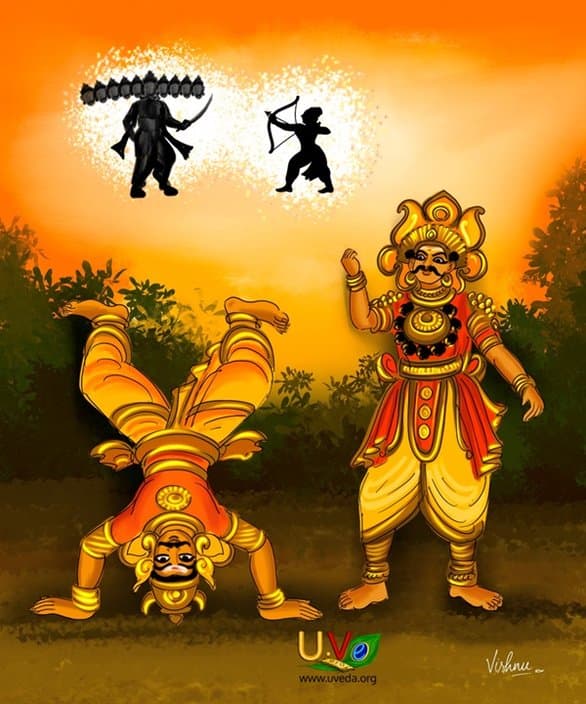Chapter 3
Kuzhamani thuram - (ஏத்துகின்றோம் நாத்)
குழமணிதூரம்

The dance performed by the defeated demons seeking refuge is known as "Kuzha Maṇi." This type of dance, performed in response to their defeat in battle, is danced upside down. The verses in this section are structured as if they are the songs of the demons performing this inverted dance, acknowledging their defeat and seeking refuge in Lord Rama.
போரில் தோல்வியடைந்த அரக்கர் அடைக்கலம் வேண்டி ஆடும் கூத்து. போரில் தோற்றவர்கள் தங்கள் தோல்விக்கு ஈடாக ஆடும் ஒரு வகைக் கூத்து குழமணி எனப் பெயர் கொண்டதாகும். இது தலைகீழாக ஆடப்படும் கூத்து. அவ்வகையில் கூத்தாடுகின்ற அரக்கர்கள் கூறும் பாசுரங்களாக அமைந்தது இப்பதிகம்.
Verses: 1868 to 1877
Grammar: Aṟuchīrk Kaḻinediladi Āsiriya Viruththam / அறுசீர்க் கழிநெடிலடி ஆசிரிய விருத்தம்
- PT 10.3.1
1868 ## ஏத்துகின்றோம் நாத் தழும்ப * இராமன் திருநாமம் *
சோத்தம் நம்பீ சுக்கிரீவா * உம்மைத் தொழுகின்றோம் **
வார்த்தை பேசீர் எம்மை * உங்கள் வானரம் கொல்லாமே *
கூத்தர் போல ஆடுகின்றோம் * குழமணிதூரமே 1 - PT 10.3.2
1869 எம்பிரானே என்னை ஆள்வாய் * என்று என்று அலற்றாதே *
அம்பின் வாய்ப்பட்டு ஆற்றகில்லாது * இந்திரசித்து அழிந்தான் **
நம்பி அநுமா சுக்கிரீவா * அங்கதனே நளனே *
கும்பகர்ணன் பட்டுப்போனான் * குழமணிதூரமே 2 - PT 10.3.3
1870 ஞாலம் ஆளும் உங்கள் கோமான் * எங்கள் இராவணற்கு *
காலன் ஆகி வந்தவா * கண்டு அஞ்சிக் கரு முகில்போல் **
நீலன் வாழ்க சுடேணன் வாழ்க * அங்கதன் வாழ்க என்று *
கோலம் ஆக ஆடுகின்றோம் * குழமணிதூரமே 3 - PT 10.3.4
1871 மணங்கள் நாறும் வார் குழலார் * மாதர்கள் ஆதரத்தை *
புணர்ந்த சிந்தைப் புன்மையாளன் * பொன்ற வரி சிலையால் **
கணங்கள் உண்ண வாளி ஆண்ட * காவலனுக்கு இளையோன் *
குணங்கள் பாடி ஆடுகின்றோம் * குழமணிதூரமே 4 - PT 10.3.5
1872 வென்றி தந்தோம் மானம் வேண்டோம் * தானம் எமக்கு ஆக *
இன்று தம்மின் எங்கள் வாழ்நாள் * எம் பெருமான் தமர்காள் **
நின்று காணீர் கண்கள் ஆர * நீர் எம்மைக் கொல்லாதே *
குன்று போல ஆடுகின்றோம் * குழமணிதூரமே 5 - PT 10.3.6
1873 கல்லின் முந்நீர் மாற்றி வந்து * காவல் கடந்து * இலங்கை
அல்லல் செய்தான் உங்கள் கோமான் * எம்மை அமர்க்களத்து **
வெல்லகில்லாது அஞ்சினோம்காண் * வெம் கதிரோன் சிறுவா *
கொல்லவேண்டா ஆடுகின்றோம் * குழமணிதூரமே 6 - PT 10.3.7
1874 மாற்றம் ஆவது இத்தனையே * வம்மின் அரக்கர் உள்ளீர் *
சீற்றம் நும்மேல் தீர வேண்டின் * சேவகம் பேசாதே **
ஆற்றல் சான்ற தொல் பிறப்பில் * அநுமனை வாழ்க என்று *
கூற்றம் அன்னார் காண ஆடீர் * குழமணிதூரமே 7 - PT 10.3.8
1875 கவள யானை பாய் புரவி * தேரொடு அரக்கர் எல்லாம்
துவள * வென்ற வென்றியாளன் தன் தமர் கொல்லாமே **
தவள மாடம் நீடு அயோத்திக் * காவலன் தன் சிறுவன் *
குவளை வண்ணன் காண ஆடீர் * குழமணிதூரமே 8 - PT 10.3.9
1876 ஏடு ஒத்து ஏந்தும் நீள் இலை வேல் * எங்கள் இராவணனார்
ஓடிப்போனார் * நாங்கள் எய்த்தோம் * உய்வது ஓர் காரணத்தால் **
சூடிப் போந்தோம் உங்கள் கோமான் * ஆணை தொடரேன்மின் *
கூடிக் கூடி ஆடுகின்றோம் * குழமணிதூரமே 9 - PT 10.3.10
1877 ## வென்ற தொல் சீர்த் தென் இலங்கை * வெம் சமத்து * அன்று அரக்கர்
குன்றம் அன்னார் ஆடி உய்ந்த * குழமணிதூரத்தை **
கன்றி நெய்ந் நீர் நின்ற வேல் கைக் * கலியன் ஒலிமாலை *
ஒன்றும் ஒன்றும் ஐந்தும் மூன்றும் * பாடிநின்று ஆடுமினே 10